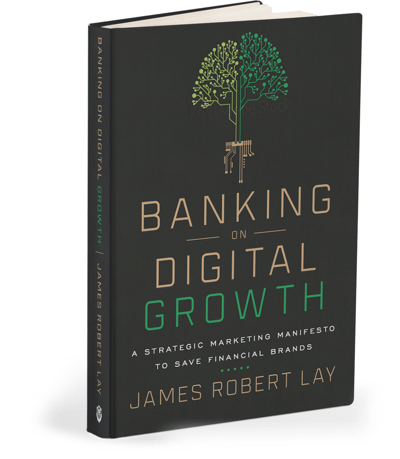Automation. Data. AI.
I've journeyed around the world speaking at events, and I've realized that these three buzzwords are shaping the next phase of digital evolution in our industry. Let's call this trio - "Ada." (Automation, Data, AI)
But the real question is, how does Ada joining your team make you feel about your future?
Excited and energized? Or confused, frustrated, and perhaps even overwhelmed?
The top 3 insights from this article:
- Similarities between the rise of the internet in 1994 and AI today
- Why education is so important for financial leaders
- Lessons from the downfall of Tower Records
Master Your Mind in the Age of AI
When I connect with financial brand leaders, the sentiments vary. Some are eager, while others are wary. This is why I feel the need to emphasize the importance of understanding and mastering the mind, our most critical tool in the age of AI.
Our mindset will determine our ability to grow and adapt in the dynamic world of finance and technology.
Not too long ago, I had a conversation with a VP of Marketing who was thrilled about AI's potential in marketing. However, her CEO’s very public fears about AI, aired during a company-wide meeting, threatened to set their company back years.
It's important to understand that the perspectives about AI are shaped by media consumption. The misunderstanding, fear, or apprehension many have towards AI reminds me of how the internet was perceived in 1994.
Let's rewind to 1994.
The internet was entering the mainstream.
I still remember watching a clip from the Today Show where the concept of the internet was discussed with a blend of curiosity and skepticism. Here is that clip:
If only they knew the behemoth it would become. It's almost amusing now, but it emphasizes the need to learn from history.
It's ironic almost 30 years later to hear Katie Couric's thoughts that she had no desire to be a part of the internet because she was so inundated with information all the time.
If only Katie knew...
The reason I share this clip during keynotes, workshops, and coaching conversations with financial brand leaders is because we are so quick to forget that the mass adoption of the internet and the way in changed our lives forever, really was not that long ago.
I have a hypothesis that how old you were in 1994 is directly impacting and influencing how you perceive the world today.
When you hear the discussions on the Today Show about the internet, they could just as easily be talking about AI and the rise of Chat GPT today.
Once again, we can learn from history as 19th-century German philosopher Arthur Schopenhauer wrote: “All truth passes through three stages: First, it is ridiculed. Second, it is violently opposed. Third, it is accepted as self-evident.”
Think about this for a moment.
When the internet first reached the mass consciousness of humanity, it was ridiculed. Perhaps there was even some violent opposition in some board and executive meetings at your financial brand about the internet back in the late 90s.
But now, look at where we are today. The truth of the internet is self-evident.
This is why education is so important for financial brands committed to maximizing their future growth potential as education is the path to transform confusion into clarity.
Interestingly, I met two gentleman, Phil and Jerry, both in their 80s, during the NAFCU’s Annual Conference. Their stories from the mid-90s, laughing off the idea of online and mobile banking. They later acknowledged how wrong they were.
Such stories remind me of Tower Records' fall, where founder Russ Solomon failed to see the transforming potential of technology and human behavior, leading to the company's bankruptcy in 2006. Take a look at this clip:
I want to come back to a main point Russ just shared. "The biggest mistake the music industry made was turning their backs on the kids. They didn't look to the future. The kids are the future."
I'd add to this thought, the biggest mistake the music industry made was not just turning their backs on the kids but also turning their backs on technology... to not learning and understand how new technology will transform human behavior.
You have to remember, Russ founded tower records in 1960 when the world was very different. He was very successful for sure but failed to let go of what he knew to reinvent himself so he could reinvent tower records for a new world with a new type of consumer.
Hearing Russ's thinking reminds me of the Kodak story that I shared in my book Banking on Digital Growth. It was Kodak who had the first early digital camera prototype all the way back in 1975. Yet they failed to fully commit to the changing technological landscape and no longer exist.
Russ even mentions that Tower Records was one of the very first to sell CDs online in 1994 which was the dawn of the internet.
However, Russ believed there was a fad element to what was going on at the time with Napster and iPods which was well before music even started streaming with platforms like pandora and then Spotify.
Did the fad of downloading music ever burn out?
It's this type of thinking Russ had as to why Tower Records --which was founded in 1960-- did not make it and eventually closed shop in 2006 filing for bankruptcy and liquidation.
Just like Russ... it's also this type of thinking --not AI-- that is one of the greatest threats to incumbent financial brands in the Age of AI.
The point?
Not keeping up with technology can be perilous.
Let's look at the banking industry as an example. In 1994, the US had 10,453 commercial banks. By 2022, that number had shrunk to 4,136. Similar trends are observable in the credit union sector. Many financial institutions falter not because of external challenges but due to internal resistance to change.
I urge leaders to look beyond their current understanding, to reimagine and reinvent themselves and their organizations for the future. The discussions about Ada - automation, data, and AI - often stir up emotions ranging from exhilaration to fear. However, rather than succumbing to apprehension, it's essential to question what we are paying attention to.
The future may be uncertain, but with a proactive approach, guided by learning and adaptability, financial brands can navigate the challenges and opportunities the age of AI presents.
Remember, it's our perspective, mindset, and willingness to learn that will determine our path forward in this exciting digital era.
Take Action Today:
- Invest in Continuous Education on Emerging Technologies: Prioritize educational programs that focus on Automation, Data, and AI (Ada) for both executives and employees. Ensure that everyone understands not just the functionalities of these technologies but also their transformative potential. Learning sessions, workshops, or even partnerships with tech companies can help demystify these concepts, transforming apprehension into actionable knowledge.
- Encourage Open Dialogue and Shift Mindsets: Create platforms for open dialogue where concerns about emerging technologies can be aired without judgment. The objective is to address fears, identify misconceptions, and build a culture of adaptability. By drawing parallels from history, such as the initial skepticism towards the internet, leaders can emphasize the importance of embracing change rather than resisting it.
- Conduct Periodic Organizational Self-Assessments: To avoid the pitfalls that companies like Tower Records and Kodak experienced, regularly assess the bank's or credit union's strategic direction in the context of technological evolution. This involves evaluating current offerings against emerging technological trends and consumer behaviors. By recognizing internal resistance and addressing it head-on, leaders can ensure they are not turning their backs on the future. Furthermore, banks should be proactive in seeking innovative solutions, collaborating with fintech startups, and reinventing their services to cater to the evolving needs of the digital consumer.
By taking these action steps, financial leaders can position their organizations at the forefront of the digital revolution, harnessing the power of technology to drive growth and deliver enhanced value to their customers.
For more about financial transformation, reach out to James Robert Lay at the Digital Growth Institute.
This article was originally published on August 9, 2023. All content © 2024 by Digital Growth Institute and may not be reproduced by any means without permission.





